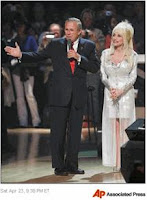
The folks who found the Ivory-Billed Woodpecker have a site: www.ivorybill.org.
There are some photographs, a story, the press release below, and some video up there right now. The promise is that more will be forthcoming.
What a good-news science story! And it's fascinating how they managed to get such a large team to operate in secret, and got the Nature Conservancy to buy up land in secret at the same time. Great stuff! The official press release:
Long Thought Extinct, Ivory-billed WoodpeckerRediscovered in Big Woods of Arkansas
Multiple sightings, video footage show bird survives in vast forested areas
BRINKLEY, Arkansas — April 28, 2005 —
Long believed to be extinct, a magnificent bird – the ivory-billed woodpecker – has been rediscovered in the Big Woods of eastern Arkansas. More than 60 years after the last confirmed sighting of the species in the United States, a research team today announced that at least one male ivory-bill still survives in vast areas of bottomland swamp forest.
Published in the journal Science on its Science Express Web site (April 28, 2005), the findings include multiple sightings of the elusive woodpecker and frame-by-frame analyses of brief video footage. The evidence was gathered during an intensive year-long search in the Cache River and White River national wildlife refuges involving more than 50 experts and field biologists working together as part of the Big Woods Conservation Partnership, led by the Cornell Laboratory of Ornithology at Cornell University and The Nature Conservancy.
“The bird captured on video is clearly an ivory-billed woodpecker,” said John Fitzpatrick, the Science article’s lead author, and director of the Cornell Laboratory of Ornithology. “Amazingly, America may have another chance to protect the future of this spectacular bird and the awesome forests in which it lives.”
“It is a landmark rediscovery,” said Scott Simon, director of The Nature Conservancy’s Arkansas chapter. “Finding the ivory-bill in Arkansas validates decades of great conservation work and represents an incredible story of hope for the future.”
Joining the search team at a press conference in Washington DC, Secretary of the Interior Gale Norton announced a Department of the Interior initiative to identify funds for recovery efforts. Through its cooperative conservation initiative, the Fish and Wildlife Service has a variety of grant and technical aid programs to support wildlife recovery.
“These programs are the heart and soul of the federal government’s commitment to cooperative conservation. They are perfectly tailored to recover this magnificent bird,” Secretary Norton said. “Across the Nation, these programs preserve millions of acres of habitat, improve riparian habitat along thousands of miles of streams and develop conservation plans for endangered species and their habitat.”
The largest woodpecker in North America, the ivory-billed woodpecker is known through lore as a bird of beauty and indomitable spirit. The species vanished after extensive clearing destroyed millions of acres of virgin forest throughout the South between the 1880s and mid-1940s.
Although the majestic bird has been sought for decades, until now there was no firm evidence that it still existed.
The rediscovery has galvanized efforts to save the Big Woods of Arkansas, 550,000 acres of bayous, bottomland forests and oxbow lakes. According to Simon, The Nature Conservancy has conserved 18,000 acres of critical habitat in the Big Woods, at the request of the partnership, since the search began. “It’s a very wild and beautiful place,” Simon said.The Search and the Evidence
While kayaking in the Cache River National Wildlife Refuge on Feb. 11, 2004, Gene Sparling of Hot Springs, Ark., saw an unusually large, red-crested woodpecker fly toward him and land on a nearby tree. He noticed several field marks suggesting the bird was an ivory-billed woodpecker.
A week later, after learning of the sighting, Tim Gallagher, editor of the Cornell Lab of Ornithology’s Living Bird magazine, and Bobby Harrison, associate professor at Oakwood College, Huntsville, Ala., interviewed Sparling. They were so convinced by his report that they traveled to Arkansas and then with Sparling to the bayou where he had seen the bird.
On Feb. 27, as Sparling paddled ahead, a large black-and-white woodpecker flew across the bayou less than 70 feet in front of Gallagher and Harrison, who simultaneously cried out: “Ivory-bill!” Minutes later, after the bird had disappeared into the forest, Gallagher and Harrison sat down to sketch independently what each had seen. Their field sketches, included in the Science article, show the characteristic patterns of white and black on the wings of the woodpecker.
“When we finished our notes,” Gallagher said, “Bobby sat down on a log, put his face in his hands and began to sob, saying, ‘I saw an ivory-bill. I saw an ivory-bill.’” Gallagher said he was too choked with emotion to speak. “Just to think this bird made it into the 21st century gives me chills. It’s like a funeral shroud has been pulled back, giving us a glimpse of a living bird, rising Lazarus-like from the grave,” he said.
The sightings by Sparling, Gallagher and Harrison led to the formation of a search team, which later became the Big Woods Conservation Partnership. On April 5, 10 and 11, three different searchers sighted an ivory-bill in nearby areas. The views were fleeting, leaving little opportunity to take photographs.
David Luneau, associate professor at the University of Arkansas at Little Rock, said he thought the best chance to film the elusive bird would be to have a camcorder on at all times. On April 25, Luneau captured four seconds of video footage showing an ivory-billed woodpecker taking off from the trunk of a tree.
Frame-by-frame analyses show a bird perched on a tupelo trunk, with a distinctive white pattern on its back. During 1.2 seconds of flight, the video reveals 11 wing beats showing extensive white on the trailing edges of the wings and white on the back. Both of these features distinguish the ivory-billed woodpecker from the superficially similar, and much more common, pileated woodpecker.
On three occasions, members of the search team heard series of loud double-raps, possibly the ivory-billed woodpecker’s display drumming. On Feb. 14, 2005, Casey Taylor of the Cornell Lab of Ornithology heard the drumming for 30 minutes, then watched as an ivory-billed woodpecker, being mobbed by crows, flew into view.
In addition, autonomous recording units detected sounds, among thousands of hours of recordings, which resembled double-raps and possible calls of the ivory-bill – reminiscent of the sound of a tin horn. Researchers say ongoing analyses of the recordings have not yet enabled them to rule out other potential sound sources, such as the calls of blue jays, which are notorious mimics.
In all, during more than 7,000 hours of search time, experienced observers reported at least 15 sightings of the ivory-bill, seven of which were described in the Science article. Because only a single bird was observed at a time, researchers say they don’t yet know whether more than one inhabits the area.
So far, the search team has focused its efforts in approximately 16 of the 850 square miles in the bottomland forests of Arkansas. Fitzpatrick of the Cornell Lab of Ornithology said that the next step will be to broaden the search to assess whether breeding pairs exist and how many ivory-bills the region may support. To expand the area being monitored and minimize disturbance to the endangered woodpecker, the team will continue to use acoustic monitoring technologies as well as on-the-ground searching. Fitzpatrick said the team will also encourage others to search for the ivory-bill elsewhere in suitable habitats throughout the South.
Simon of The Nature Conservancy said that over the years, state and federal agencies, conservation organizations, hunters and landowners have aggressively worked to conserve and restore the bottomland hardwood and swamp ecosystem. “Now we know we must work even harder to conserve this critical habitat – not just for the ivory-billed woodpecker, but for the black bears, waterfowl and many other species of these unique woods,” he added.
The partnership’s 10-year goal is to restore 200,000 more acres of forest in the Big Woods. The effort will include conserving forest habitat, improving river water quality, and restoring the physical structure of the river channels, focusing in locations with maximum benefit in reconnecting forest patches and protecting river health.
“The ivory-bill tells us that we could actually bring this system back to that primeval forest here in the heartland of North America,” said Fitzpatrick, who is also a member of The Nature Conservancy’s board of governors. “That’s the kind of forest that I hope some generation of Americans and citizens of the world will get to come and visit.”
For more information about the search and the efforts to save the ivory-billed woodpecker and the Big Woods, visit www.ivorybill.org.
***
The Cornell Laboratory of Ornithology is a nonprofit membership institution with the mission to interpret and conserve the Earth’s biological diversity though research, education, and citizen science focused on birds. From its headquarters at the Imogene Powers Johnson Center for Birds and Biodiversity in Ithaca, N.Y., the Lab leads international efforts in bird monitoring and conservation, and fosters the ability of enthusiasts of all ages and skill levels to make a difference.
The Nature Conservancy is a nonprofit organization that preserves plants, animals and natural communities representing the diversity of life on Earth by protecting the lands and waters they need to survive. To date, the Conservancy has been responsible for protecting more than 15 million acres in the United States and more than 102 million acres in Latin America, the Caribbean, Asia and the Pacific. Since The Conservancy’s Arkansas office opened in 1982, it has worked with the U.S. Fish and Wildlife Service, the Arkansas Natural Heritage Commission, the Arkansas Game and Fish Commission as well as private citizens, corporations, and foundations, to bring into conservation management more than 120,000 acres in the Arkansas delta.
The Big Woods Conservation Partnership includes the Cornell Lab of Ornithology, The Nature Conservancy, Oakwood College in Huntsville, Ala., Louisiana State University, the University of Arkansas at Little Rock, the Arkansas Natural Heritage Commission, the Arkansas Game and Fish Commission, the U.S. Fish and Wildlife Service, Birdman Productions, LLC, and Civic Enterprises, LLC.




















